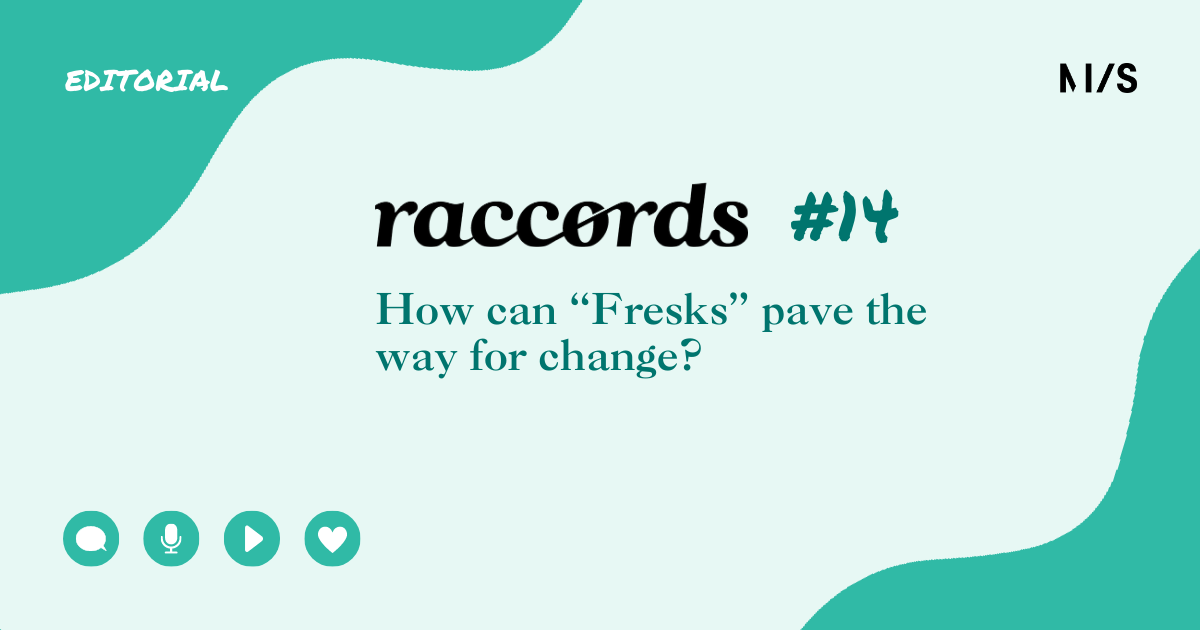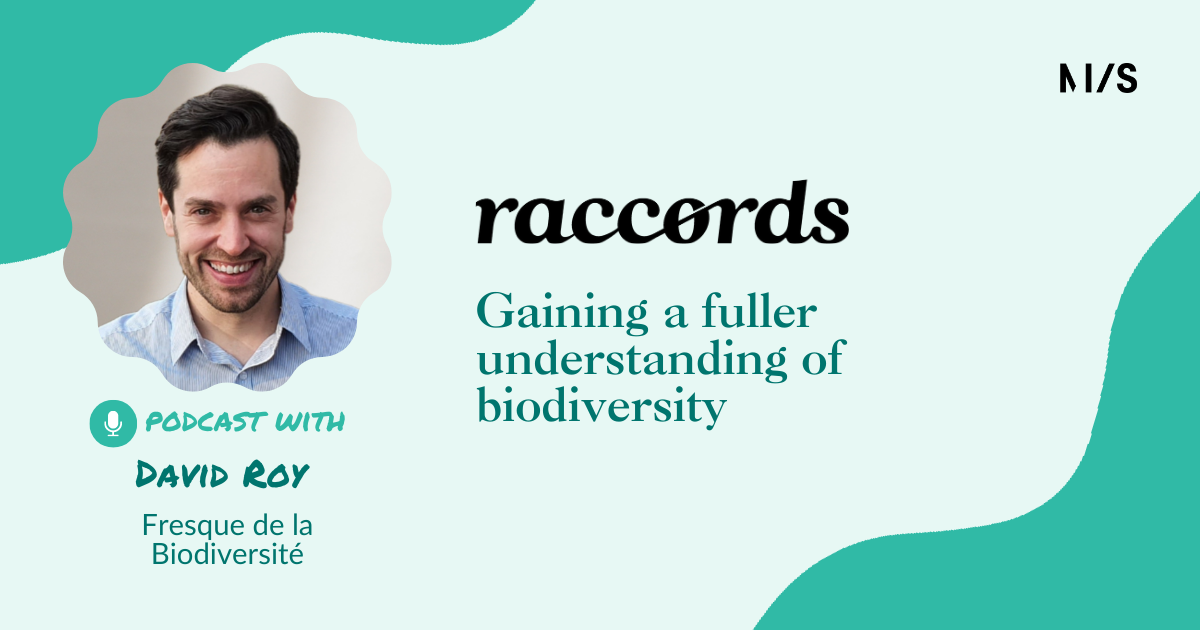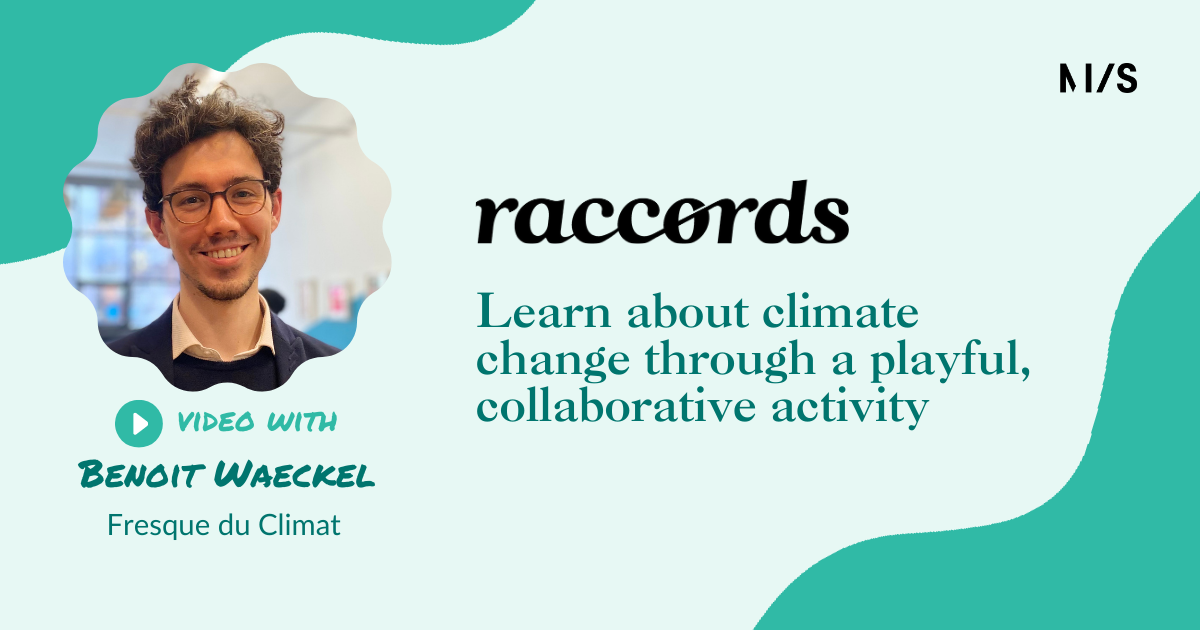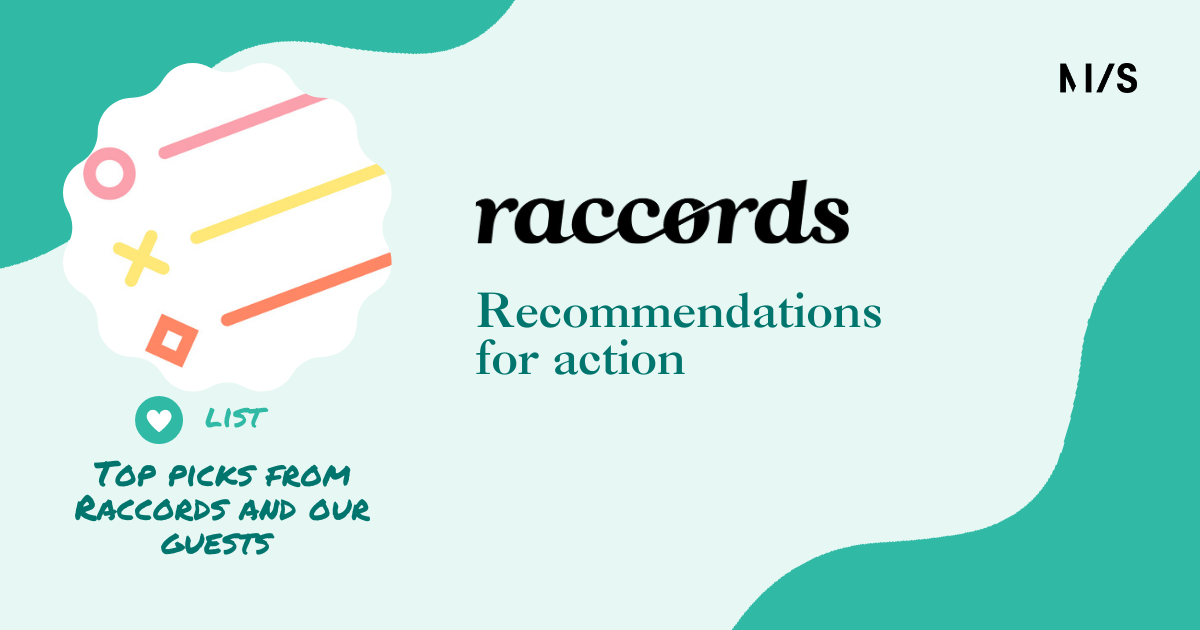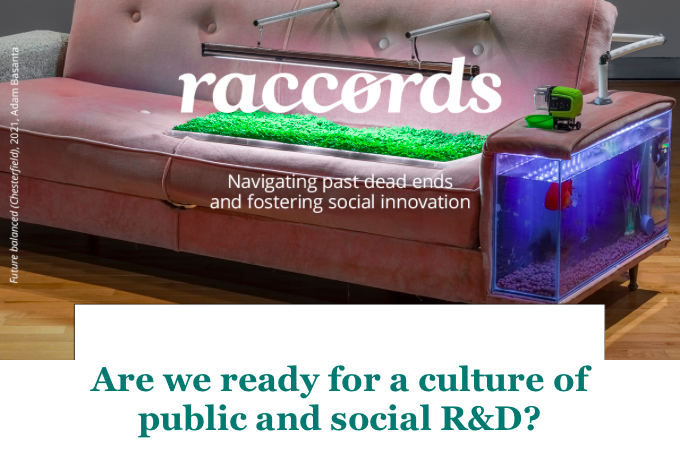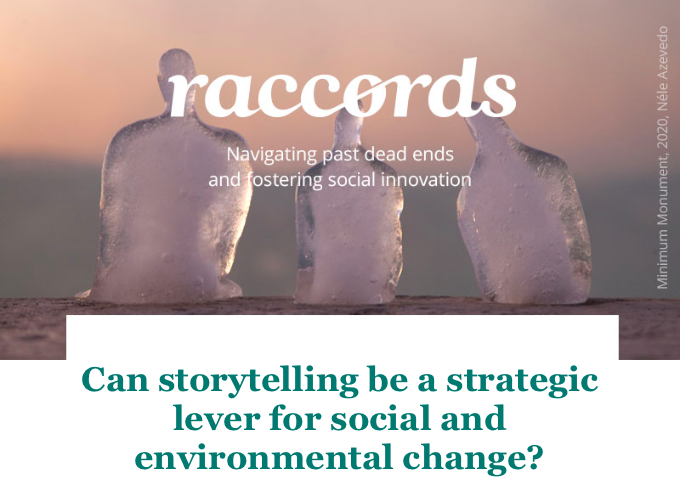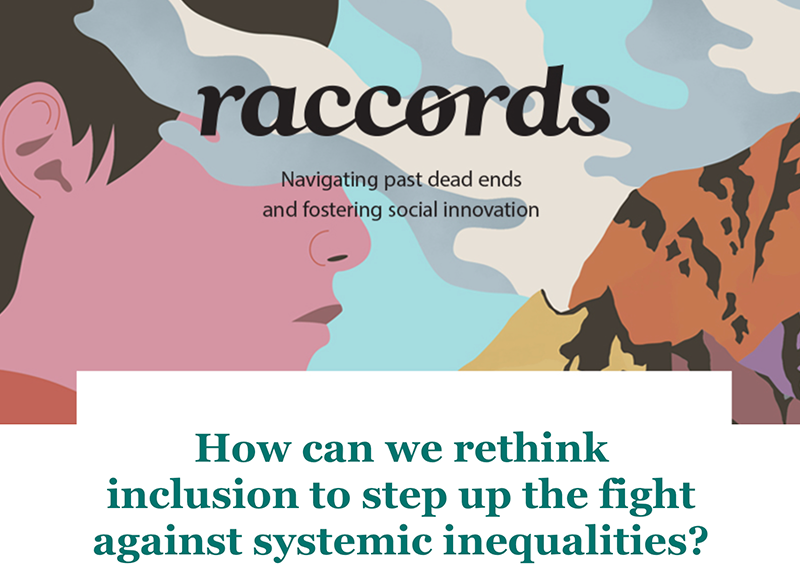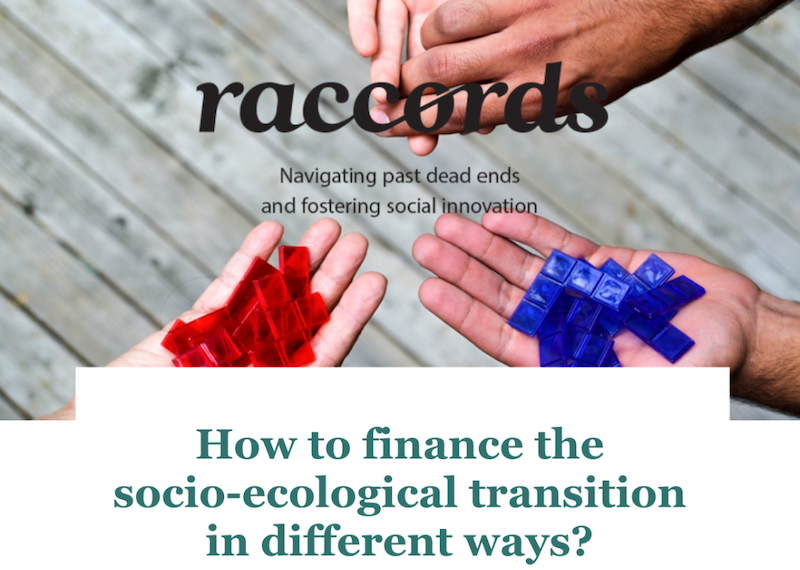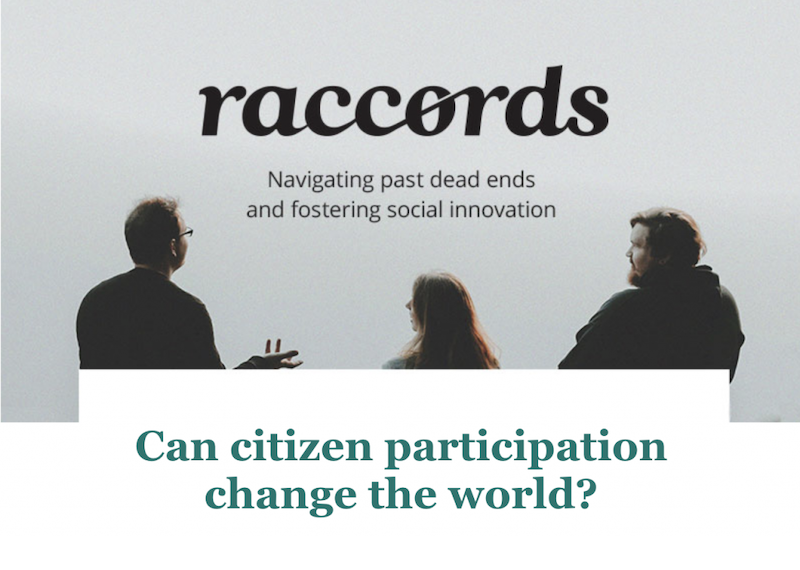#14, June 2023
THE INTERVIEW
Redefining our social norms to overcome the socio-ecological impasse

Photo: Courtesy of Laetitia Guibert
For the past decade, Laetitia Guibert has been helping companies integrate environmental and social dimensions into their business models. After experiencing frustration with the slow pace of the progress she observed, she launched the ACT Transition project, for which she co-developed La Fresque des Nouveaux Récits and the organization of the same name.
The challenge of La Fresque des Nouveaux Récits
Based on the latest findings in neuroscience, La Fresque is a tool that enables individuals, companies, and institutions to imagine a different—and better—future. Nothing less. Raccords caught up with her to discuss her revolution of ideas.
Interview with Laetitia Guibert from La Fresque des Nouveaux Récits
Raccords: You dedicated yourself to the field of corporate social responsibility (CSR) for many years. Why have you changed direction today? In your view, what didn’t work about this approach?
Laetitia Guibert: I’ve asked myself a lot: What’s stopping us? What makes it so difficult to mobilize people around the issues of transformation, sustainable development, and CSR? Why is it that, even though we know that we’re on a collision course with a wall, we’re running toward it even faster? Taking a step back, I realized that today’s methods of supporting change omit an essential prism: the human factor. We try to change organizations through strategies and action plans, with beautiful road maps and indicators, but we don’t take into consideration the people who make them up—that is, human beings who are endowed with cognitive and emotional capacities that can be real drivers of, as well as real obstacles to, change and action.
I decided to pursue a training course on the neurocognitive and behavioural approach at the Institut de NeuroCognitivisme in Paris. The course was put together by Jacques Fradin, who is also co-founder and president of the Groupe International d’Experts sur les Changements de Comportement (GIECO). This group could be described as the IPCC of behaviour. It brings together sociologists, anthropologists, neuroscientists, and psychologists who are trying to understand what part the human factor has to play in the challenge of transformation and the shift towards a more sober society.
Raccords: The expression you use,”tipping point,” recalls the work of Donella Meadows, who notably took part in drafting the famous report Limits to Growth in 1972. She alluded to what she called “leverage points,” which she described as “places within a complex system (a corporation, an economy, a living body, a city, an ecosystem) where a small shift in one thing can produce big changes in everything.” She included “mindset” in this list — the change in paradigm and the way we see the world.
Laetitia Guibert: That’s exactly what I’m working on: how to shift organizational models. Clearly, the purely strategic approach isn’t sufficient today. It’s been 50 years since the Meadows report came out. We’ve known for 50 years that we’re getting closer, year after year, to what the Meadows report predicted. And yet, we haven’t managed to shift our society, our behaviours. What have we forgotten to take into consideration? The human factor!
With this in mind, I created the ACT Transition project to support the behavioural transformation of organizations. To begin with, I set out in search of all the players who could fit into an ecosystem of the human factor linked to the ecological transition. And I crossed paths with Alexis Klein and Benoît Rolland de Ravel, with whom I co-founded La Fresque des Nouveaux Récits.
The intention of La Fresque des Nouveaux Récits is to understand the extent to which the stories we create in our organizations and in our society influence our behaviour. These narratives can be real brakes on the ecological transition, on the one hand, and levers for change, on the other.
With La Fresque, we want to contribute to the emergence of a desirable future, compatible with planetary limits, through imagination.
Raccords: Tell us a little about what stories are to you and why they are so important.
Laetitia Guibert: In Yuval Noah Harari’s book Sapiens, we learn that a cognitive revolution took place 70,000 years ago that gave Homo sapiens the ability to imagine and transformed us into a storytelling species.
We are one of the only species in the world to produce fictional narratives and—thanks to these narratives—to cooperate in very great numbers, and over very long and very wide spans of time and space.
Take money, for example. We’ve managed to give a material reality to banknotes and coins. However, you have only to visit a community that doesn’t use money for transactions to see that it’s an invented concept. Our scrap of paper will mean nothing to the other person, because they don’t tell themselves the same story as we do. And yet the story of money shows just how capable we are of cooperating, since people on the other side of the world whom we don’t even know also have this concept of money.
The human species is highly sociable, and it needs the group to survive. In order to get along with others, we created social norms. Think of standards of politeness, dress, and social distance: these norms are obviously essential, because we need to cooperate in our society. But they can be obstacles to the ecological transition today. We have plenty of somewhat unconscious social norms, like, “To be healthy, you have to eat meat every day.” Who said that? It’s a story we tell ourselves. “If you’re going to travel, you should go someplace far away.” “To be free, you need a car.”
These social norms are more or less unconscious. The problem is that many of them are incompatible with the challenges of the transition. I call them “socio-ecocidal” norms.
These norms can also be a real lever, provided we think about them differently. We could disseminate social norms that are desirable and more compatible with the challenges of ecological transition. For example, we could make it obvious that traveling locally is just as fulfilling as traveling far away. We could reimagine social norms of mobility, food, and housing. Does everyone have to have a house, a detached house with a big yard, and a nice swimming pool, or are we increasingly moving towards shared housing? Could shared housing be a new social norm? And how do we transform these norms?
Raccords: It’s precisely the role of La Fresque des Nouveaux Récits to create new stories, new social norms. To what extent do you think it will be possible to alter these socio-ecocidal norms? Do you really believe you’ll be able to convince our entire society to change its point of view?
Laetitia Guibert: To have an effect, you don’t need to convince everybody. According to certain theories, for a behaviour to become commonplace in a society, 15 percent of the population needs to adopt it.¹ We sometimes talk about “early adopters” or the “early majority”, and before them, “innovators.” The more influential people there are in the first 15 percent, the faster the tipping point is reached.
How do we get to the social tipping point? By disseminating new narratives.
There are really three intentions behind La Fresque. Firstly, to make our participants understand that human beings are a storytelling species, that we tell stories all the time, and that stories construct our society. Secondly, we want to make it clear that some of these stories are actually holding back the ecological transition. The good news—and this is the third purpose of the workshop—is that we have the capacity to move beyond these dominant narratives by creating and disseminating new ones. If we’ve been able to create the narratives that are obstructing the transition today, that means we’re also capable of inventing others.
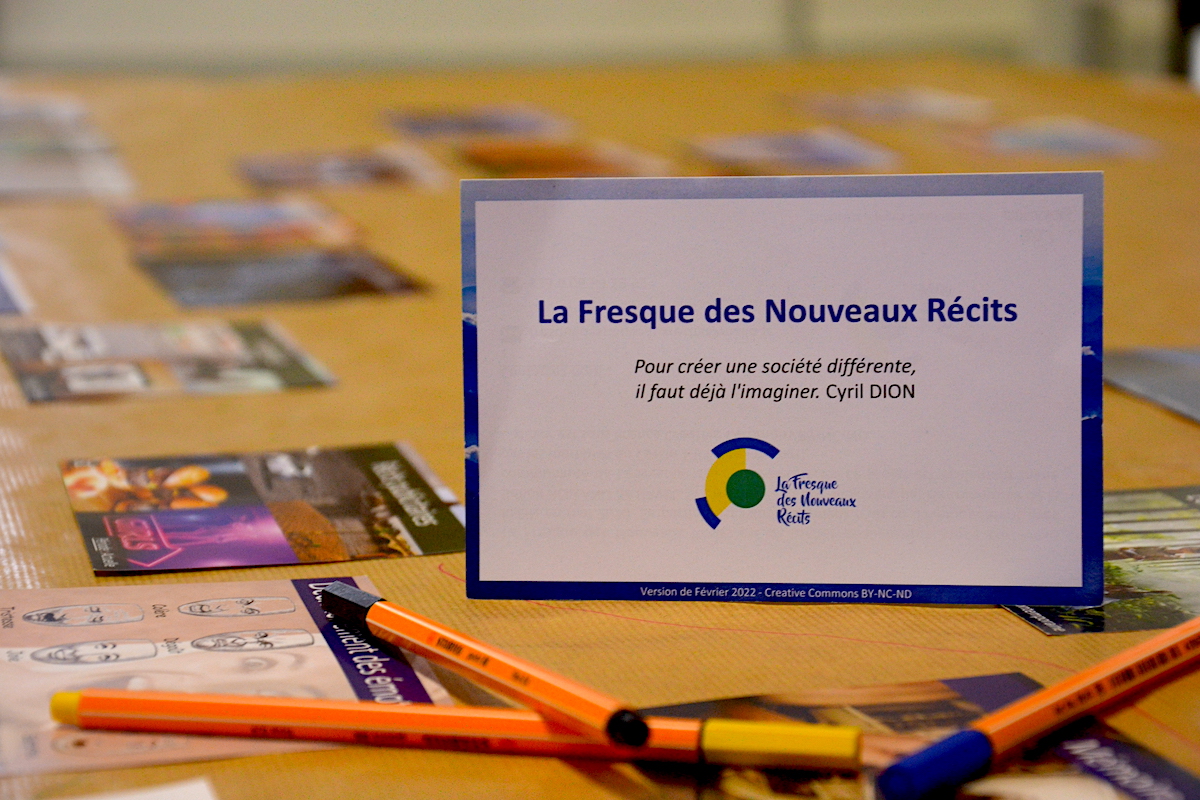
Photo: Courtesy of Laetitia Guibert
Raccords: What role do art and cultural productions play in spreading these new ideas? We already know that storytelling can be a lever for social change. How can new narratives influence artists?
Laetitia Guibert: Following the Second World War, the United States took advantage of its dominant position in France to force the acceptance of the Blum-Byrnes agreements. These agreements abolished quotas on Hollywood films in France. The United States clearly understood the power of film on Western imaginations in particular, and the extent to which behaviour could be influenced by cinema, by theatre. This is what we call “soft power.” This is how our narrative of success and happiness was transformed into a North American concept of material possession, accumulation, and excess.
Cyril Dion, director of the documentary Demain, and actress Marion Cotillard have launched a production company called Newtopia whose objective is to promote “the New Ecological Way of Life”—a nod to the historical moment when the United States imposed its “American way of life.”
The idea is to produce narratives about desirable worlds. Because there are plenty of films about the destruction of the world. But films that promote more desirable social norms, such as a society that coexists in greater harmony with the living world, are few and far between.
For the moment, many of the stories we tell ourselves about society in 2100 are about the collapse or colonization of another planet. These are often alarmist narratives. We say, “We’re all going to die. Life is going to disappear.” The problem with these alarmist narratives is that they tend to plunge us into a state of paralysis. Why is that? Because they create an enormous cognitive dissonance, a distance between our convictions and our actions. The majority of us don’t have the deep desire to destroy life on Earth, yet we behave on a daily basis as though we do. This creates dissonance, which our brain doesn’t like, and which it will therefore find ways to mitigate. The right way to reduce dissonance would be to change our behaviours to align them with our beliefs. But many of us will instead change our beliefs to align them with our behaviours. This can mean denying responsibility—telling ourselves, “It’s not my fault; after all, other people pollute more than I do.” It can also take the form of cognitive rationalization, where we trivialize the information we receive: “It doesn’t matter if I take the plane. It’s leaving whether I’m on it or not, so I might as well go.”
Not to mention that the more you scare people, the more you increase their cognitive dissonance. And in this case, the “easy” exit strategies are trivialization, cognitive rationalization, and the denial of responsibility—all of which lead to maintaining the status quo. Cognitively, scaring people doesn’t change anything.
We need to stop spreading narratives about the world of tomorrow that scare people. Because if we want to create behavioural change, we have to create the opposite, cognitively speaking. We need to create what we call desirable realistic utopias about tomorrow’s world in order to make people want to project themselves into a world that’s cool, yet realistic.
Raccords: Are people receptive to this rhetoric? Do you sense any resistance to the change you’re proposing?
Laetitia Guibert: It depends. When it’s offered to the general public, La Fresque attracts a lot of the so-called pioneers of the transition—the famous “innovators” and “early adopters.” These people are predisposed to listen to the arguments in favour of transition.
To get as many people on board as possible, the workshop is structured around the three phases of change management.
We begin with a first phase in which participants organize five sets of cards with causal links to uncover the major narratives that structure our societies. We attempt to show that the status quo around dominant narratives is illegitimate. With the help of maps, similar to those used in Climate Fresk, we identify the five key cards that obstruct the ecological transition.
Then we show participants that the status quo can be changed. We bring in “solutions” cards to help answer questions: How can I move beyond these narratives? How can I take action?
Finally, in the last part, we show participants how to activate change by imagining new stories. This part, developed by Benoît Rolland de Ravel, is called the Fabrique des Utopies Réalistes. The goal is to get participants to imagine the emergence of a new social norm more compatible with the challenges of ecological transition. The group will project themselves into the year 2030 and describe how, in seven or eight years, a social norm will have evolved, for example, away from a meat-based diet toward a vegetarian diet.
By addressing the early adopters, we hope to give them the opportunity to empower themselves in the face of the feeling of helplessness that can be common in this context. Knowing that we’re part of that 15 percent allows us to realize that the job is less daunting than it seems. I like to give concrete examples which aren’t necessarily related to the ecological transition. For example, in France, post COVID, there’s been a big shake-up with regard to telecommuting. Before COVID, there was a lot of reticence, a lot of very negative beliefs about teleworking: “I can’t control my colleague, he doesn’t do anything. He’s not going to be efficient. I can’t see if he’s really working,” etc. It took a pandemic to completely democratize telecommuting. Today, companies are offering two or three days of telecommuting a week, or even saying, “We’re fully remote, we trust you.” People who were reluctant to telecommute will do it once or twice, and finally say to themselves: “It’s becoming the norm, so I’m fine with it.”
That’s something like how La Fresque is positioned. It’s not necessarily about wasting energy trying to change the behaviour of the most resistant. It’s about trusting the paradigm-shift curve and saying, “We’ll make sure we’ll reach 15 percent quickly.”
That said, it’s also a hindrance to the spread of ideas to address ourselves only to those who are already persuaded. We’re thinking about how to spread these stories so that they don’t get stuck in a bubble. How can we inspire people who wouldn’t be likely to come across this type of story? We’re thinking about the dissemination channels we can use, starting with our website. We have a blog section that we feed with accounts of story creation. We also share them on LinkedIn. We need to deploy and find other channels to disseminate all these stories even further. That’s the big project for 2023.
Raccords: You talk a lot about changes in people’s perceptions. But what role do these stories play in companies?
Laetitia Guibert: A company is full of stories. Think, for example, of the idea that a company exists to grow. That a company exists to maximize profit for its shareholders. These are important stories we tell ourselves. It’s because all companies share this narrative that it works the way it does, but it’s perfectly possible to imagine other narratives. That’s what’s happening in France with B Corp, which is a big movement towards mission-driven companies.
In these mission-driven companies, the corporate narrative is no longer focused solely on creating wealth in a given territory. It’s also about saying that a company can be a societal player and contribute to the common good. By changing the story we tell ourselves about companies, we change processes, and therefore behaviours. Another link, even more societal, is that today, we measure a country’s wealth and power by its GDP. But we’re the ones who decide that this is the appropriate indicator. It could be something else. It could be Gross Domestic Happiness rather than Gross Domestic Product. It’s up to us to decide.
Alternative narratives haven’t made much of an impact yet, but by making them take up more space, by convincing more and more companies to follow the new model, we’ll reach the tipping point.
More and more often, we’re presenting La Fresque des Nouveaux Récits to companies. In this instance, the second part involves imagining “the companies of the next world” rather than “realistic utopias.” Once again, we project ourselves into 2030, but this time we ask ourselves what sustainable-development objective companies could contribute to, for example. We speculate about what the company will have put in place to change its business model. It’s a powerful exercise, because it’s similar to foresight or visioning exercises. But the key question is how to move from a profitable company to a contributing one.
Raccords: We’re beginning to see the emergence of alternative indicators, for instance, the Indicateurs du bien-être au Québec [Indicators of Well-Being in Québec], which look at biodiversity, the environment, the vitality of indigenous languages, or the wage gap between men and women as markers of our economy’s success. Ultimately, what you’re proposing is to replace traditional indicators with ways of measuring a company’s impact on society. But how are these new indicators, which come out of an emerging narrative on what success is, received within companies? You’re not just talking to “early adopters” now.
Laetitia Guibert: With the first part of La Fresque, we see that our behaviour today is hugely influenced by narratives, by social norms, by stories we tell ourselves in a very unconscious way. This discovery can generate reactance in participants who are not immediately convinced.
It’s true that La Fresque reveals that much of our behaviour is conditioned by invisible human factors. There’s cognitive bias, conformity bias. Cognitive-science studies show that we make 35,000 decisions every day, and that over 90 percent of them are made automatically, and pretty irrationally.
One reaction we often see is, “Are you telling me I don’t have free will?” People like to think that it’s their choice to want or hope one day to own a big house, a big yard, and a big car, and to take trips every year. The story comes from their parents, and society sells it to them as an ideal.
In the corporate world, in particular, reactance will come from people for whom the organization’s narrative is so deeply ingrained that thinking about it from any angle other than a financial one is not possible. For these people, a company that doesn’t perform well financially might as well not exist.
Raccords: It seems, then, that the role of coaches is particularly important in this process.
Laetitia Guibert: Absolutely. Coaches need to have the tools to enable people to take a step back. That’s why, when we offer La Fresque in companies, the people who run the program are experts who have undergone extensive training to ensure that they are able to facilitate the experience in the best way. In particular, in managing the reactance that can occur.
At the end of the process, we see again and again that we’re absolutely capable of imagining a different way of doing business. The more numerous the companies are who follow this new model, the closer to the tipping point we get.
¹ The Tipping Point: How Little Things Can Make a Big Difference, Malcolm Gladwell
About our guest
After earning a master’s degree in science, sustainable development, and eco-innovation, Laetitia Guibert worked for 10 years supporting companies in implementing sustainable development strategies. With the goal of accelerating the pace of change, in 2021 she launched La Fresque des Nouveaux Récits, which invites people to “invent new narratives around transition to modify the cognitive architecture that governs our behaviours.” She is certified in the Neurocognitive and Behavioural Approach (NBA), which enables her to combine neuroscience with CSR.
Read the other sections of this issue
Browse previous issues of Raccords



